Graham Reid | | 2 min read
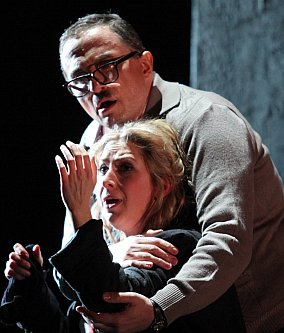
If any opera can successfully be relocated into our own time it is Verdi's grand sweep through corruption, avarice, lust, power play and venality that is Rigoletto.
Here are familiar elements of contemporary political life played out in broad sweeps, and so it was entirely apt the New Zealand Opera production should be located in a chillingly crass world that bears strong resemblance to that netherworld of corruption and lust inhabited by former Italian prime minister Silvio Berlusconi.
From the opening scene we see a chorus political minions riding the coat tails of the lascivious Duke of Mantua, the overly made-up women and concubines of the notorious “bunga-bunga” parties, the battery of screens showing brightly lit images from populist television . . .
Welcome to the world as we know it, where revenge is played out, politically motivated courtiers scheme and play tricks on rivals, and the deformed, self-loathing court jester pays a heavy price for enjoying the Duke's protection as he does down those around him.
Brilliantly staged by director Lindy Hume (see interview here), Stephen Anthony Whiting and designer Richard Roberts, this was a thrilling production of a story which has some fundamental narrative flaws.
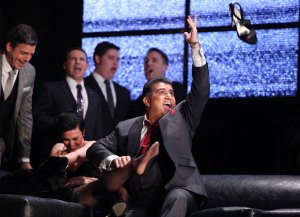 While Rigoletto must suffer for his
role in the grand scheme, it always seems odd the venal Duke should
go largely unpunished (losing the girl seems the least of it), a man
much more evil in the way the plot unfurls. The flirtation between
the Duke and Countess Ceprano also seems incidental if emblematic,
and goes nowhere in the larger picture.
While Rigoletto must suffer for his
role in the grand scheme, it always seems odd the venal Duke should
go largely unpunished (losing the girl seems the least of it), a man
much more evil in the way the plot unfurls. The flirtation between
the Duke and Countess Ceprano also seems incidental if emblematic,
and goes nowhere in the larger picture.
But that is in the nature of the story and the cast here delivered with conviction and through some remarkable voices.
The Aotea Centre's overhaul has allowed for much improved sound and notes were allowed to fade, the powerful voices filling the space with often breathtaking assertiveness.
As Rigoletto, Warwick Fife seems more a battered office worker than a conniving jester putting down others, but that recasting also worked to the play's advantage. His ultimate fall – the powerful death scene at the end, although long and full of melodrama -- was all the more touching as his character seems so emotionally weak and pathetically corrupt but, through love for his daughter Gilda, never beyond redemption.
As the emotionally immature Gilda, Emma Pearson delivered with a rare feel for her fragility and almost adolescent fickleness.
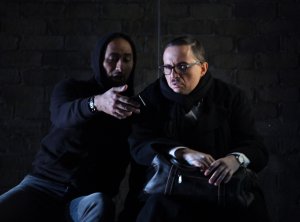 This was a seamless production design
written on a big scale – the revolving set making the most of grand
rooms off set by smaller setting such as the bus stop where Rigoletto
meets the hired assassin Sparafucile (played and sung with snaky
subtlety by Ashraf Sewailam from beneath a menacing hoody). The more
intimate moments were also given great attention.
This was a seamless production design
written on a big scale – the revolving set making the most of grand
rooms off set by smaller setting such as the bus stop where Rigoletto
meets the hired assassin Sparafucile (played and sung with snaky
subtlety by Ashraf Sewailam from beneath a menacing hoody). The more
intimate moments were also given great attention.
The moves from dark to light, from passionate intensity to solitary reflection, were sensitively paced, the Auckland Philharmonia Orchestra under Wyn Davies vigorous and bold.
From the bruising arrogance of Rafael Rojas' Duke to the exaggerated sensuality of Maddalena (Kristin Darragh thoroughly enjoying the contemporary freedom she was offered in the role), this was a thrilling, engaging and deliciously colourful setting of Verdi.
Delivered with passion and bravura force, it pulled the audience into a world at once familiar and contemporary, but also offered a timeless moral lesson acted out in a way that, like Shakespeare tragedies, can only end in dramatic, heart-aching death.
Photos from the Wellington production by Neil Mackenzie

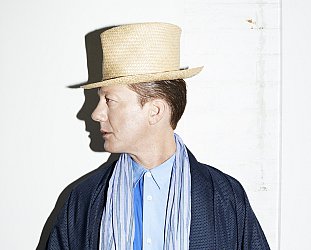
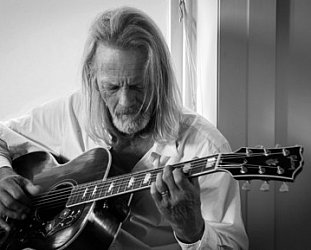
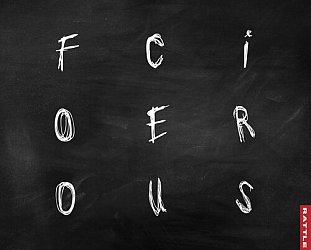
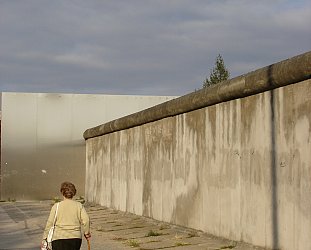
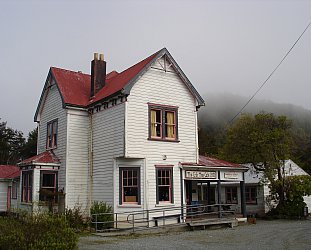

post a comment